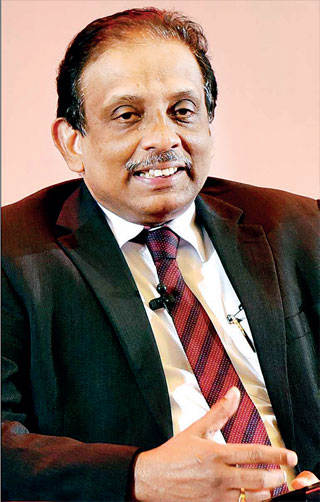Sunday Feb 22, 2026
Sunday Feb 22, 2026
Thursday, 13 January 2022 01:31 - - {{hitsCtrl.values.hits}}
By Kumar Ranaweera
 |
| Finance Minister Basil Rajapaksa |
 |
| Treasury Secretary S.R. Attygalle
|
“The revenue effort is doubled. Technology is brought in. Strict tax discipline is brought in. It has to work like in other countries, like for example, Pakistan where leakage was prevented by technology taking over tax administration. I will not underestimate the challenges, but this has to happen. Currently, operational expenditure is 17% and revenue is 9% and we are in a current account deficit. The Government hopes to generate 3% savings within revenue and operational expenditure with the measures that have been taken. The budget is turning into savings because there is no point in a government asking people to save, unless the Government saves,” Jayasundera said setting the tone.
However, this administration has made a habit of reversing decisions, and this failing is now seemingly impacting its revenue policy as well. Though relevant, this doesn’t compare to the controversy surrounding agricultural inputs. The Government’s effort to promote carbonic fertiliser is a noble one, but it simply lacked a measured approach. But what must be avoided are situations where the Government accedes to policy changes to suit the interests of a vested few, alongside conjuring populist relief measures that upsets the balance of its long-term effort. Two examples spring to mind.
On one hand, despite the Government increasing cigarette prices during the budget and spelling out a rationalisation move under the new Special Goods and Services Tax scheme, the National Authority on Tobacco and Alcohol (NATA) is calling for a new tax formula to determine the price of a cigarette. Its Chairman, Dr. Samadhi Rajapakse, unveiled a formula – in an event reminiscent of the late Mangala Samaraweera – which he claims will increase annual incomes from cigarettes by 6%. Rajapakse states the formula consists of six separate components; Cigarette Tax Percentage, Proposed Price for next years, Inflation Percentage, Present Price, GDP, and the external factor of 4%. The 4% external factor is added to ensure the price of a cigarette is increased every year, even if inflation drops to zero.
Why is a government agency pulling on the legs of the state to satisfy the vested interests of its foreign sponsors? The central Government through the Treasury has embarked upon a tax rationalisation effort as spelt out in the budget with a long-term view encompassing revenue, public health and industry. NATA is well within its function to make recommendations on public health matters concerning smoking, but its efforts to undermine the fiscal strategy of the Government at a decisive time in the nation’s economic journey is questionable.
It is common knowledge the anti-tobacco lobby in Sri Lanka is funded by US and UK-based agencies, and the local lobby has gone far as paying journalists to give prominence to their narratives.
The NATA proposal is an untimely foreign effort to undermine the plans of the Government; it is an unfortunate attempt to use a state agency to stall the plans and progress of the Government to serve vested interests.
Furthermore, addressing the media, the NATA Chairman espoused raising the legal age to purchase tobacco products from 21 to 24. In a country that already offers the most expensive cigarettes in the world, it is questionable why such draconian measures must even be considered. Plus, how will this impact our tourism product? Tourism is listed as one of Sri Lanka’s primary industries especially in the present milieu. How will these rules apply to travellers? Or will this be another situation of one country with two laws, where locals must wait and watch what we cannot touch, but for foreigners to indulge freely by choice on our own soil? How about the beedi industry, why is NATA not at all interested in the massive revenue loss and lack of regulations concerning the lion’s share of tobacco consumption in this country.
The Government must be cautious so it does not get swayed by double standards of its own agencies. The finance minister and the Treasury spelt out a progressive piece of policy that takes a sustainable approach encompassing all stakeholders imperative to the economic journey of this country. Let us stick to that master plan and not those of foreign-sponsored agents.
Secondly, the Government’s sudden announcement of a relief package to public servants and pensioners brings some worry. The Government’s popularity has taken a beating in recent times due to its economic woes that has now been passed down to the public, and some suspect if this proposal was a populist move to retain support. With no provisions in the budget to support this additional Rs. 220 billion in expenditure, analysts say the Government would have to infuse liquidity into the market and that would naturally lead to increased inflation heaping further burden on the system.
One of the primary concerns of the business community and analysts at large is the lack of a cohesive and concrete plan to address our foreign exchange crisis. The domestic economy is growing, there is no question about that. But the health and well-being of the domestic economy relies heavily on the progress of our external account. Here again, it is hoped for better clarity and commitment from the highest levels towards a sustainable and manageable plan that will steer Sri Lanka out of troubled waters. Dr. Jayasundera said in November the Government will stick to its budget plan. That’s what we should be doing.
Elaborating on 14 steps taken by the Government to achieve its target for 2027, Dr. Jayasundera in November last year said Government will first do away with the annual warrant practice, whereby Parliament approves a budget and ministries casually spend that sum on an annual basis. This would be replaced with a quarterly warrant administered by the Treasury.
“Next, no matter how much we tried there is no commitment control, and as a result the budget runs on to arrears. Nobody can prevent it because the Treasury is unaware of spending, even Ministry secretaries. But the Ministry and its agencies have committed. Contracts have been awarded and signed. No checks and balances. So, the next step is commitment control; strictly according to financial regulations.
“The third one is phasing out fiscal support, particularly operational support for state enterprises. They are running very comfortably and only the Chairman and the Board looks at the budget, and life goes on with no control elsewhere. They must learn to look at revenue and expenditure and improve performance. Also, the Secretary to the Treasury must within two weeks submit to parliament all amendments to the appropriation bill, which is being debated in parliament, preventing supplementary budgets this year. Which means this is all, manage it! That is the discipline,” Dr. Jayasundera said.
(The writer serves as Research Assistant at a leading audit firm in Sri Lanka.)